Deck 10: Choices Involving Time
Question
Question
Question
Question
Question
Question
Question
Question
Question
Question
Question
Question
Question
Question
Question
Question
Question
Question
Question
Question
Question
Question
Question
Question
Question
Question
Question
Question
Question
Question
Question
Question
Question
Question
Question
Question
Question
Question
Question
Question
Question
Question
Question
Question
Question
Question
Question
Question
Question
Question
Question
Question
Question
Question
Question
Question
Question
Question
Question
Question
Question
Question
Question
Question
Question
Question
Question
Question
Question
Question
Question
Question

Unlock Deck
Sign up to unlock the cards in this deck!
Unlock Deck
Unlock Deck
1/72
Play
Full screen (f)
Deck 10: Choices Involving Time
1
A ______ is a legally binding promise to make specific future payments.
A) stock
B) coupon
C) bond
D) deposit
A) stock
B) coupon
C) bond
D) deposit
bond
2
Refer to Figure 10.1.Suppose the individual is initially at point b.Based on the figure,the individual could afford to increase his utility by: 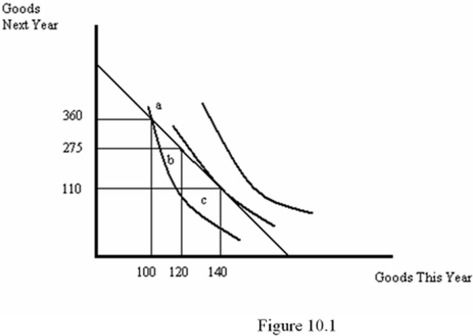
A) consuming more today and less tomorrow.
B) consuming more today and more tomorrow.
C) consuming more tomorrow and less today.
D) consuming less today and less tomorrow.

A) consuming more today and less tomorrow.
B) consuming more today and more tomorrow.
C) consuming more tomorrow and less today.
D) consuming less today and less tomorrow.
consuming more today and less tomorrow.
3
Assume the interest rate is 5%.What is the present discounted value of a $1,000 bond that pays a $50 coupon each year for 10 years?
A) $989.91
B) $999.91
C) $1,000.00
D) $1,009.99
A) $989.91
B) $999.91
C) $1,000.00
D) $1,009.99
$1,000.00
4
Suppose you borrow $1,000 at 8% for 2 years.If the interest is compounded annually,how much money will you owe at the end of those 2 years?
A) $1,080.00
B) $1,160.00
C) $1,166.40
D) $1,345.60
A) $1,080.00
B) $1,160.00
C) $1,166.40
D) $1,345.60

Unlock Deck
Unlock for access to all 72 flashcards in this deck.
Unlock Deck
k this deck
5
Suppose the interest rate is 6% and compounded annually.What is the present discounted value of 6 future annual payments of $150?
A) $634.46
B) $737.60
C) $849.06
D) $900.00
A) $634.46
B) $737.60
C) $849.06
D) $900.00

Unlock Deck
Unlock for access to all 72 flashcards in this deck.
Unlock Deck
k this deck
6
If a bank is lending money at 6.25% while the government is lending money at 8.25% and the rate of inflation is 3.5%,what is the real interest being earned by the bank?
A) 2.00%
B) 2.66%
C) 2.75%
D) 6.25%
A) 2.00%
B) 2.66%
C) 2.75%
D) 6.25%

Unlock Deck
Unlock for access to all 72 flashcards in this deck.
Unlock Deck
k this deck
7
If the real interest rate is 7.5% and the rate of inflation is 3%,what is the nominal interest rate?
A) 4.50%
B) 4.57%
C) 10.50%
D) 10.73%
A) 4.50%
B) 4.57%
C) 10.50%
D) 10.73%

Unlock Deck
Unlock for access to all 72 flashcards in this deck.
Unlock Deck
k this deck
8
Suppose you lend $2,500 at 11.5% for 3 years.If the interest is compounded annually,how much interest will you receive in those 3 years?
A) $862.50
B) $965.49
C) $3,362.50
D) $2,465.49
A) $862.50
B) $965.49
C) $3,362.50
D) $2,465.49

Unlock Deck
Unlock for access to all 72 flashcards in this deck.
Unlock Deck
k this deck
9
At an interest rate of 8.25% compounded annually,what is the present discounted value of $2,000 to be received 2 years from now?
A) $1670.00
B) $1706.77
C) $1716.74
D) $1835.00
A) $1670.00
B) $1706.77
C) $1716.74
D) $1835.00

Unlock Deck
Unlock for access to all 72 flashcards in this deck.
Unlock Deck
k this deck
10
All else equal,at what interest rate would the PDV of a lottery prize that pays $1,000,000 today and $1,000,000 each year for the next 19 years be equal to $10,000,000?
A) 5.26%
B) 7.75%
C) 8.92%
D) 50.00%
A) 5.26%
B) 7.75%
C) 8.92%
D) 50.00%

Unlock Deck
Unlock for access to all 72 flashcards in this deck.
Unlock Deck
k this deck
11
Which of following statements about bonds is NOT true?
A) Bonds have a variable term.
B) The face value of a bond is the amount to be paid at maturity.
C) The maturity of a bond refers to the period over which payments are made.
D) When interest rates rise, the present discounted value of a bond falls.
A) Bonds have a variable term.
B) The face value of a bond is the amount to be paid at maturity.
C) The maturity of a bond refers to the period over which payments are made.
D) When interest rates rise, the present discounted value of a bond falls.

Unlock Deck
Unlock for access to all 72 flashcards in this deck.
Unlock Deck
k this deck
12
A ______ chance of default will cause the interest rate to be ______.
A) more variable; lower
B) less variable; higher
C) higher; lower
D) higher; higher
A) more variable; lower
B) less variable; higher
C) higher; lower
D) higher; higher

Unlock Deck
Unlock for access to all 72 flashcards in this deck.
Unlock Deck
k this deck
13
Given the formula PDV = $F/(1 + R)T,the PDV is smaller when the number of years is ______ and when the interest rate is ______.
A) smaller; lower
B) smaller; higher
C) larger; lower
D) larger; higher
A) smaller; lower
B) smaller; higher
C) larger; lower
D) larger; higher

Unlock Deck
Unlock for access to all 72 flashcards in this deck.
Unlock Deck
k this deck
14
All else equal,if the interest rate is 5%,what is the PDV of a lottery prize that pays $1,000,000 today and $1,000,000 each year for the next 19 years?
A) $10,500,000
B) $12,462,210
C) $13,085,321
D) $20,000,000
A) $10,500,000
B) $12,462,210
C) $13,085,321
D) $20,000,000

Unlock Deck
Unlock for access to all 72 flashcards in this deck.
Unlock Deck
k this deck
15
The amount of money borrowed in a transaction is called:
A) interest.
B) principal.
C) internal rate of return.
D) present discounted value.
A) interest.
B) principal.
C) internal rate of return.
D) present discounted value.

Unlock Deck
Unlock for access to all 72 flashcards in this deck.
Unlock Deck
k this deck
16
A consumption bundle is affordable as long as:
A) it is a point that is on an indifference curve that is to the right of the budget line.
B) it is a point that falls on the 45 degree line.
C) the present discount value of the consumption stream is less than the present discount value of the income stream.
D) the amount of the good consumed from year to year does not increase.
A) it is a point that is on an indifference curve that is to the right of the budget line.
B) it is a point that falls on the 45 degree line.
C) the present discount value of the consumption stream is less than the present discount value of the income stream.
D) the amount of the good consumed from year to year does not increase.

Unlock Deck
Unlock for access to all 72 flashcards in this deck.
Unlock Deck
k this deck
17
Which of the following statements about nominal interest and real interest is true?
A) Nominal interest is a yearly rate and real interest is a monthly rate.
B) Nominal interest does not adjust for inflation, whereas real interest does.
C) Nominal interest is what the lender receives and real interest is what the borrower pays.
D) Nominal interest and real interest are two ways of saying the same thing.
A) Nominal interest is a yearly rate and real interest is a monthly rate.
B) Nominal interest does not adjust for inflation, whereas real interest does.
C) Nominal interest is what the lender receives and real interest is what the borrower pays.
D) Nominal interest and real interest are two ways of saying the same thing.

Unlock Deck
Unlock for access to all 72 flashcards in this deck.
Unlock Deck
k this deck
18
The amount of money a lender requires for the use of funds is called:
A) interest.
B) principal.
C) internal rate of return.
D) present discounted value.
A) interest.
B) principal.
C) internal rate of return.
D) present discounted value.

Unlock Deck
Unlock for access to all 72 flashcards in this deck.
Unlock Deck
k this deck
19
The current worth of a claim on future resources is called:
A) net present value.
B) future value.
C) present discounted value.
D) internal rate of return.
A) net present value.
B) future value.
C) present discounted value.
D) internal rate of return.

Unlock Deck
Unlock for access to all 72 flashcards in this deck.
Unlock Deck
k this deck
20
Which scenario has a higher present discounted value (assume interest is compounded annually); $100 received in 3 years if the interest rate is 8% or $90 received in 2 years if the interest rate is 7.25%?
A) $100 owed in 3 years
B) $90 owed in 2 years
C) Both scenarios have the same present discounted value.
D) It cannot be determined with information provided.
A) $100 owed in 3 years
B) $90 owed in 2 years
C) Both scenarios have the same present discounted value.
D) It cannot be determined with information provided.

Unlock Deck
Unlock for access to all 72 flashcards in this deck.
Unlock Deck
k this deck
21
Suppose a consumer's utility function is U(F0,F1)= F00.5F10.5,where F0 represents food consumed this year and F1 represents food consumed next year.For that utility function,the marginal utility of food consumed this year is 0.5 × (F1/F0)0.5 and the marginal utility of food consumed next year is 0.5 × (F0/F1)0.5.Suppose the consumer earns $100 this year and nothing in the next,food costs $1 per unit in both years,and the interest rate is 10%.How much does she spend this year,and how much does she save?
A) She spends $45 this year and saves $55.
B) She spends $50 this year and saves $50.
C) She spends $55 this year and saves $45.
D) She spends $95 this year and saves $5.
A) She spends $45 this year and saves $55.
B) She spends $50 this year and saves $50.
C) She spends $55 this year and saves $45.
D) She spends $95 this year and saves $5.

Unlock Deck
Unlock for access to all 72 flashcards in this deck.
Unlock Deck
k this deck
22
What happens to borrowing when interest rates rise?
A) It increases.
B) It decreases.
C) It can increase or decrease.
D) Borrowing decisions are independent of interest rates.
A) It increases.
B) It decreases.
C) It can increase or decrease.
D) Borrowing decisions are independent of interest rates.

Unlock Deck
Unlock for access to all 72 flashcards in this deck.
Unlock Deck
k this deck
23
Which of the following is a way the government can stimulate saving?
A) Decrease interest rates
B) Increase taxes
C) Offering tax incentives for retirement accounts
D) There is nothing the government can do to stimulate saving.
A) Decrease interest rates
B) Increase taxes
C) Offering tax incentives for retirement accounts
D) There is nothing the government can do to stimulate saving.

Unlock Deck
Unlock for access to all 72 flashcards in this deck.
Unlock Deck
k this deck
24
Refer to Figure 10.1.Suppose the individual is initially at point b.Based on the figure,the individual is currently: 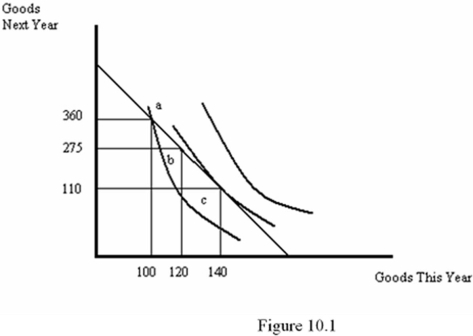
A) a saver, which is his optimal choice.
B) a borrower, which is his optimal choice.
C) a saver, though borrowing would increase his utility.
D) a borrower, though saving would increase his utility.

A) a saver, which is his optimal choice.
B) a borrower, which is his optimal choice.
C) a saver, though borrowing would increase his utility.
D) a borrower, though saving would increase his utility.

Unlock Deck
Unlock for access to all 72 flashcards in this deck.
Unlock Deck
k this deck
25
When the interest rate rises,saving becomes ______ rewarding and borrowing becomes ______ costly.
A) less; less
B) less; more
C) more; less
D) more; more
A) less; less
B) less; more
C) more; less
D) more; more

Unlock Deck
Unlock for access to all 72 flashcards in this deck.
Unlock Deck
k this deck
26
What happens to saving when interest rates rise?
A) It increases.
B) It decreases.
C) It can increase or decrease.
D) Saving decisions are independent of interest rates.
A) It increases.
B) It decreases.
C) It can increase or decrease.
D) Saving decisions are independent of interest rates.

Unlock Deck
Unlock for access to all 72 flashcards in this deck.
Unlock Deck
k this deck
27
Refer to Figure 10.2.Which line represents saving? 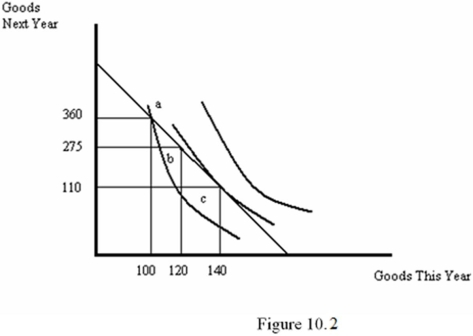
A) b
B) h
C) f + i
D) d

A) b
B) h
C) f + i
D) d

Unlock Deck
Unlock for access to all 72 flashcards in this deck.
Unlock Deck
k this deck
28
Which of the following is NOT used to describe an investment?
A) It is a means of saving.
B) It is a way of acquiring capital.
C) It is an up-front cost.
D) It holds the expectation of generating future profits.
A) It is a means of saving.
B) It is a way of acquiring capital.
C) It is an up-front cost.
D) It holds the expectation of generating future profits.

Unlock Deck
Unlock for access to all 72 flashcards in this deck.
Unlock Deck
k this deck
29
Suppose a consumer's utility function is U(F0,F1)= F00.5F10.5,where F0 represents food consumed this year and F1 represents food consumed next year.For that utility function,the marginal utility of food consumed this year is 0.5 × (F1/F0)0.5 and the marginal utility of food consumed next year is 0.5 × (F0/F1)0.5.Suppose the consumer earns $100 this year and nothing in the next,food costs $1 per unit in both years,and the interest rate is 10%.How much food does she consume this year,and how much does consume tomorrow?
A) She consumes 45 units of food this year and 55 units of food next year.
B) She consumes 50 units of food this year and 50 units of food next year.
C) She consumes 55 units of food this year and 50 units of food next year.
D) She consumes 50 units of food this year and 55 units of food next year.
A) She consumes 45 units of food this year and 55 units of food next year.
B) She consumes 50 units of food this year and 50 units of food next year.
C) She consumes 55 units of food this year and 50 units of food next year.
D) She consumes 50 units of food this year and 55 units of food next year.

Unlock Deck
Unlock for access to all 72 flashcards in this deck.
Unlock Deck
k this deck
30
Suppose a consumer's utility function is U(F0,F1)= F00.6F10.4,where F0 represents food consumed this year and F1 represents food consumed next year.For that utility function,the marginal utility of food consumed this year is 0.6 × (F1/F0)0.4 and the marginal utility of food consumed next year is 0.4 × (F0/F1)0.6.Which of the following expressions gives the consumer's marginal rate of substitution for food this year with food next year (MRS01)?
A) MRS01 = F1/F0
B) MRS01 = (2/3) × (F0/F1)
C) MRS01 = (2/3) × (F1/F0)
D) MRS01 = (3/2) × (F1/F0)
A) MRS01 = F1/F0
B) MRS01 = (2/3) × (F0/F1)
C) MRS01 = (2/3) × (F1/F0)
D) MRS01 = (3/2) × (F1/F0)

Unlock Deck
Unlock for access to all 72 flashcards in this deck.
Unlock Deck
k this deck
31
Which of the following is NOT a reason people save?
A) To reach consumption bundles in the future that would otherwise be unattainable
B) To protect against unforeseen expenses
C) To maximize their current consumption
D) To earn additional money on unused income
A) To reach consumption bundles in the future that would otherwise be unattainable
B) To protect against unforeseen expenses
C) To maximize their current consumption
D) To earn additional money on unused income

Unlock Deck
Unlock for access to all 72 flashcards in this deck.
Unlock Deck
k this deck
32
Suppose you make $1,000 investment today that you believe will have a one-time return of $2,500 in 5 years.If the interest rate is 12%,will you have a profitable investment?
A) Yes, because the NPV is positive
B) Yes, because the NPV is negative
C) No, because the NPV is positive
D) No, because the NPV is negative
A) Yes, because the NPV is positive
B) Yes, because the NPV is negative
C) No, because the NPV is positive
D) No, because the NPV is negative

Unlock Deck
Unlock for access to all 72 flashcards in this deck.
Unlock Deck
k this deck
33
Refer to Figure 10.2.Which line represents wealth? 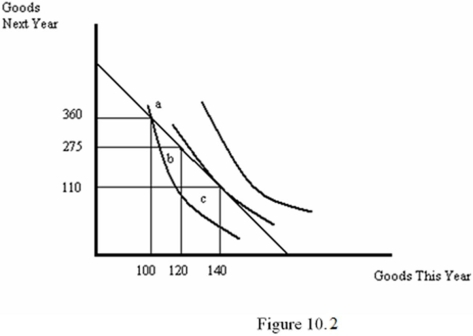
A) b
B) h
C) f + i
D) g

A) b
B) h
C) f + i
D) g

Unlock Deck
Unlock for access to all 72 flashcards in this deck.
Unlock Deck
k this deck
34
The difference between revenue and cost during a single year of a project's life is called the:
A) interest rate.
B) net present value.
C) net cash flow.
D) profit.
A) interest rate.
B) net present value.
C) net cash flow.
D) profit.

Unlock Deck
Unlock for access to all 72 flashcards in this deck.
Unlock Deck
k this deck
35
The NPV criterion states that an investment project is profitable when its NPV is ______ and unprofitable when its NPV is ______.
A) positive; positive
B) positive; negative
C) negative; positive
D) negative; negative
A) positive; positive
B) positive; negative
C) negative; positive
D) negative; negative

Unlock Deck
Unlock for access to all 72 flashcards in this deck.
Unlock Deck
k this deck
36
The difference between the present discount value of a revenue stream and the present discount value of a cost stream is called the:
A) interest rate.
B) net present value.
C) net cash flow.
D) profit.
A) interest rate.
B) net present value.
C) net cash flow.
D) profit.

Unlock Deck
Unlock for access to all 72 flashcards in this deck.
Unlock Deck
k this deck
37
Refer to Figure 10.2.For an individual that prefers a stable living standard,which line represents the best feasible consumption path? 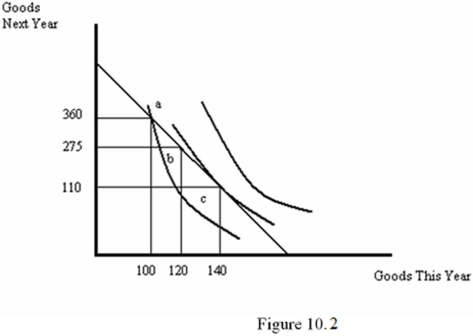
A) a
B) b
C) c
D) h

A) a
B) b
C) c
D) h

Unlock Deck
Unlock for access to all 72 flashcards in this deck.
Unlock Deck
k this deck
38
Which of the following are two main assumptions of The Life Cycle Hypothesis?
A) People can earn in both the first and second stages of their life. People also prefer stability in their consumption patterns.
B) People earn in the first stage of their life, but they don't earn in the second stage of their life. Interest rates are higher in the second period of a person's life than they are in the first period of a person's life.
C) People earn in the first stage of their life, but they don't earn in the second stage of their life. People also prefer stability in their consumption patterns.
D) People earn in the first stage of their life, but they don't earn in the second stage of their life. People are indifferent about the stability of their consumption patterns.
A) People can earn in both the first and second stages of their life. People also prefer stability in their consumption patterns.
B) People earn in the first stage of their life, but they don't earn in the second stage of their life. Interest rates are higher in the second period of a person's life than they are in the first period of a person's life.
C) People earn in the first stage of their life, but they don't earn in the second stage of their life. People also prefer stability in their consumption patterns.
D) People earn in the first stage of their life, but they don't earn in the second stage of their life. People are indifferent about the stability of their consumption patterns.

Unlock Deck
Unlock for access to all 72 flashcards in this deck.
Unlock Deck
k this deck
39
Refer to Figure 10.2.Which line represents earnings? 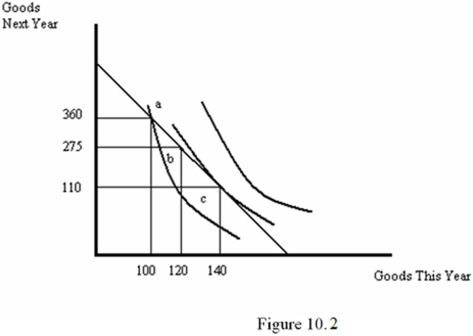
A) b
B) h
C) f + i
D) d

A) b
B) h
C) f + i
D) d

Unlock Deck
Unlock for access to all 72 flashcards in this deck.
Unlock Deck
k this deck
40
Which statement about the Life Cycle Hypothesis is NOT true?
A) It describes the choices of consumers who live for a long time.
B) It separates consumers' earnings into two stages.
C) It assumes that people prefer instability.
D) It assumes that people prefer a higher standard of living to a lower standard of living.
A) It describes the choices of consumers who live for a long time.
B) It separates consumers' earnings into two stages.
C) It assumes that people prefer instability.
D) It assumes that people prefer a higher standard of living to a lower standard of living.

Unlock Deck
Unlock for access to all 72 flashcards in this deck.
Unlock Deck
k this deck
41
A project is profitable when its internal rate of return is ______ the interest rate.
A) greater than
B) less than
C) equal to
D) less variable
A) greater than
B) less than
C) equal to
D) less variable

Unlock Deck
Unlock for access to all 72 flashcards in this deck.
Unlock Deck
k this deck
42
Table 10.1 shows the cash flows and discounted cash flows for three mutually exclusive projects available to a company.Assume an interest rate of 5%.Which project has the highest NPV? 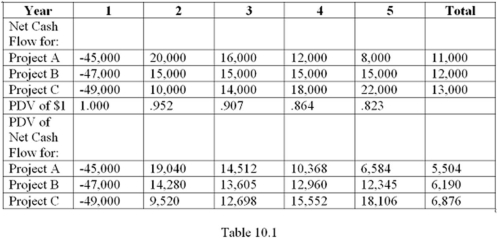
A) Project A
B) Project B
C) Project C
D) It cannot be determined from the information given.

A) Project A
B) Project B
C) Project C
D) It cannot be determined from the information given.

Unlock Deck
Unlock for access to all 72 flashcards in this deck.
Unlock Deck
k this deck
43
You have made an investment of $250 that will yield a profit of $30 in one year.If the interest rate is 11.5% is this a good investment?
A) Yes, because the internal rate of return is greater than the interest rate
B) Yes, because the interest rate is greater than the internal rate of return
C) No, because the internal rate of return is greater than the interest rate
D) No, because the interest rate is greater than the internal rate of return
A) Yes, because the internal rate of return is greater than the interest rate
B) Yes, because the interest rate is greater than the internal rate of return
C) No, because the internal rate of return is greater than the interest rate
D) No, because the interest rate is greater than the internal rate of return

Unlock Deck
Unlock for access to all 72 flashcards in this deck.
Unlock Deck
k this deck
44
If a project has an initial investment of $20,000 and consecutive yearly cash inflows of $5,000,$8000,$10,000 and $7,000,respectively,what is its payback period?
A) 2 years
B) 2.5 years
C) 2.7 years
D) 3 years
A) 2 years
B) 2.5 years
C) 2.7 years
D) 3 years

Unlock Deck
Unlock for access to all 72 flashcards in this deck.
Unlock Deck
k this deck
45
Table 10.1 shows the cash flows and discounted cash flows for three mutually exclusive projects available to a company.Assume an interest rate of 5%.Which project should the company choose if they want to maximize their return? 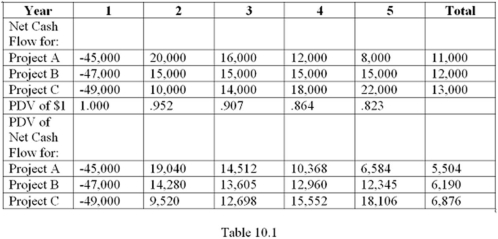
A) Project A
B) Project B
C) Project C
D) It cannot be determined from the information given.

A) Project A
B) Project B
C) Project C
D) It cannot be determined from the information given.

Unlock Deck
Unlock for access to all 72 flashcards in this deck.
Unlock Deck
k this deck
46
Suppose you have put $5,000 into a project that should generate cash inflows of $1,250 for each of the next 5 years.If the interest rate is 8% is this a good investment?
A) Yes, because you will earn a profit of $1,250 dollars in 5 years
B) Yes, because the internal rate of return is higher than the interest rate
C) No, because the internal rate of return is higher than the interest rate
D) No, because the net present value is negative
A) Yes, because you will earn a profit of $1,250 dollars in 5 years
B) Yes, because the internal rate of return is higher than the interest rate
C) No, because the internal rate of return is higher than the interest rate
D) No, because the net present value is negative

Unlock Deck
Unlock for access to all 72 flashcards in this deck.
Unlock Deck
k this deck
47
The rate of interest at which a project's NPV is exactly zero is called its:
A) equilibrium rate.
B) internal rate of return.
C) break-even rate.
D) zero net rate.
A) equilibrium rate.
B) internal rate of return.
C) break-even rate.
D) zero net rate.

Unlock Deck
Unlock for access to all 72 flashcards in this deck.
Unlock Deck
k this deck
48
Table 10.1 shows the cash flows and discounted cash flows for three mutually exclusive projects available to a company.Assume an interest rate of 5%.Which project should the company choose if they want to recover their initial investment as soon as possible? 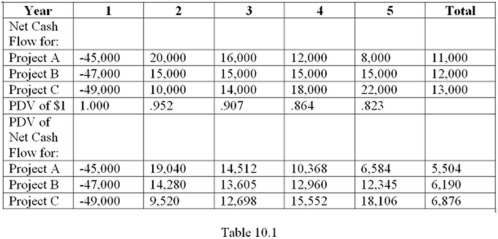
A) Project A
B) Project B
C) Project C
D) It cannot be determined from the information given.

A) Project A
B) Project B
C) Project C
D) It cannot be determined from the information given.

Unlock Deck
Unlock for access to all 72 flashcards in this deck.
Unlock Deck
k this deck
49
Which of the following is NOT a reason why an increase in the interest rate usually makes investment projects less attractive?
A) At a higher rate, future dollars are worth less compared to current dollars.
B) A typical investment project incurs the majority of its costs early in its life.
C) A typical investment project receives a disproportionate fraction of its revenue early in its life.
D) At a higher rate, putting money into the bank is more attractive.
A) At a higher rate, future dollars are worth less compared to current dollars.
B) A typical investment project incurs the majority of its costs early in its life.
C) A typical investment project receives a disproportionate fraction of its revenue early in its life.
D) At a higher rate, putting money into the bank is more attractive.

Unlock Deck
Unlock for access to all 72 flashcards in this deck.
Unlock Deck
k this deck
50
What is another term for time value of money?
A) Net present value
B) Internal rate of return
C) Opportunity cost of funds
D) Yield to maturity
A) Net present value
B) Internal rate of return
C) Opportunity cost of funds
D) Yield to maturity

Unlock Deck
Unlock for access to all 72 flashcards in this deck.
Unlock Deck
k this deck
51
The amount of time required before a project's total inflows match its total outflows is the:
A) break-even period.
B) payback period.
C) duration.
D) yield to maturity.
A) break-even period.
B) payback period.
C) duration.
D) yield to maturity.

Unlock Deck
Unlock for access to all 72 flashcards in this deck.
Unlock Deck
k this deck
52
Suppose the interest rate is 8%.If a project requires an initial investment of $5,000 and returns $5,500 in a year,what is its internal rate of return?
A) 2%
B) 8%
C) 10%
D) 18%
A) 2%
B) 8%
C) 10%
D) 18%

Unlock Deck
Unlock for access to all 72 flashcards in this deck.
Unlock Deck
k this deck
53
Suppose you have put $5,000 into a project that should generate cash inflows of $1,250 for each of the next 5 years.How long will it take to recover your initial investment?
A) 3 years
B) 3.5 years
C) 4 years
D) 4.2 years
A) 3 years
B) 3.5 years
C) 4 years
D) 4.2 years

Unlock Deck
Unlock for access to all 72 flashcards in this deck.
Unlock Deck
k this deck
54
A bond's internal rate of return is also known as its:
A) coupon.
B) payback period.
C) duration.
D) yield to maturity.
A) coupon.
B) payback period.
C) duration.
D) yield to maturity.

Unlock Deck
Unlock for access to all 72 flashcards in this deck.
Unlock Deck
k this deck
55
Suppose you make a $5,000 investment that will return $3,000 in year 2 and another $3,500 in year 4.With an interest rate of 4.5%,what is the NPV of this project?
A) $247.34
B) $682.16
C) $1,500.00
D) $2,162.50
A) $247.34
B) $682.16
C) $1,500.00
D) $2,162.50

Unlock Deck
Unlock for access to all 72 flashcards in this deck.
Unlock Deck
k this deck
56
You have made an investment of $250 that will yield a profit of $30 in one year.If the interest rate is 11.5%,what is your internal rate of return?
A) 10.7%
B) 11.8%
C) 12.0%
D) 12.2%
A) 10.7%
B) 11.8%
C) 12.0%
D) 12.2%

Unlock Deck
Unlock for access to all 72 flashcards in this deck.
Unlock Deck
k this deck
57
Suppose you are looking to add more capacity to your current manufacturing plant.The new project will cost $6 million up front and is projected to increase revenue $1.5 million a year for each of the next 5 years.If the interest rate is 8%,what is this project's NPV and is it a profitable investment?
A) $10,935; yes it is profitable
B) -$10,935; no it is not profitable
C) $944,444; yes it is profitable
D) -$944,444; no it is not profitable
A) $10,935; yes it is profitable
B) -$10,935; no it is not profitable
C) $944,444; yes it is profitable
D) -$944,444; no it is not profitable

Unlock Deck
Unlock for access to all 72 flashcards in this deck.
Unlock Deck
k this deck
58
Table 10.1 shows the cash flows and discounted cash flows for three mutually exclusive projects available to a company.Assume an interest rate of 5%.Which project has the shortest payback period? 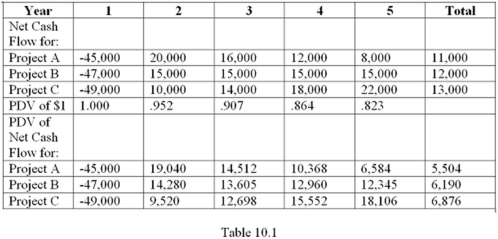
A) Project A
B) Project B
C) Project C
D) It cannot be determined from the information given.

A) Project A
B) Project B
C) Project C
D) It cannot be determined from the information given.

Unlock Deck
Unlock for access to all 72 flashcards in this deck.
Unlock Deck
k this deck
59
Table 10.1 shows the cash flows and discounted cash flows for three mutually exclusive projects available to a company.Assume an interest rate of 5%.Which project has the highest internal rate of return? 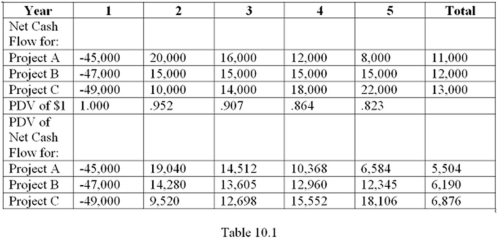
A) Project A
B) Project B
C) Project C
D) It cannot be determined from the information given.

A) Project A
B) Project B
C) Project C
D) It cannot be determined from the information given.

Unlock Deck
Unlock for access to all 72 flashcards in this deck.
Unlock Deck
k this deck
60
When someone buys a bond,they give up the bond's price in exchange for:
A) right of ownership.
B) future income.
C) current income.
D) stock.
A) right of ownership.
B) future income.
C) current income.
D) stock.

Unlock Deck
Unlock for access to all 72 flashcards in this deck.
Unlock Deck
k this deck
61
Jennifer has just finished high school and is deciding whether to start working or go to college.She has already been offered a job that pays $35,000 a year.Four years of college will cost $12,000 each year.She would earn an extra $20,000 each year after she graduates for the 45 years she plans on working until she retires.Jennifer should invest in college when the net present value of that investment is ______ and the internal rate of return is ______ the current interest rate.
A) positive; greater than
B) negative; greater than
C) positive; less than
D) negative; less than
A) positive; greater than
B) negative; greater than
C) positive; less than
D) negative; less than

Unlock Deck
Unlock for access to all 72 flashcards in this deck.
Unlock Deck
k this deck
62
Jennifer has just finished high school and is deciding whether to start working or go to college.She has already been offered a job that pays $35,000 a year.Four years of college will cost $12,000 each year.She would earn an extra $20,000 each year after she graduates for the 45 years she plans on working until she retires.Assume that the interest rate is 8.5%.What is Jennifer's opportunity cost of one year of college?
A) $12,000
B) $17,000
C) $35,000
D) $47,000
A) $12,000
B) $17,000
C) $35,000
D) $47,000

Unlock Deck
Unlock for access to all 72 flashcards in this deck.
Unlock Deck
k this deck
63
Using a carefully-labeled graph,explain the Life Cycle Hypothesis.What are some of the implications of the Life Cycle Hypothesis?

Unlock Deck
Unlock for access to all 72 flashcards in this deck.
Unlock Deck
k this deck
64
What would the interest rate need to be in order to earn $100 on an investment of $1,000 over two years? Assume interest compounds annually.

Unlock Deck
Unlock for access to all 72 flashcards in this deck.
Unlock Deck
k this deck
65
Joe has just retired and would like to convert some of his savings into an annuity that will pay him an equal amount each year for the next 5 years.If the current interest rate is 5.75%,how much money will he have to invest in order to receive $30,000 a year?

Unlock Deck
Unlock for access to all 72 flashcards in this deck.
Unlock Deck
k this deck
66
Jennifer has just finished high school and is deciding whether to start working or go to college.She has already been offered a job that pays $35,000 a year.Four years of college will cost $12,000 each year.She would earn an extra $20,000 each year after she graduates for the 45 years she plans on working until she retires.Assume that the interest rate is 8.5%.What is the net present value of the decision to invest in college?
A) $136,877
B) $126,154
C) $12,487
D) $11,508
A) $136,877
B) $126,154
C) $12,487
D) $11,508

Unlock Deck
Unlock for access to all 72 flashcards in this deck.
Unlock Deck
k this deck
67
Suppose you use the rate of inflation as the interest rate for determining the present value of $1.What would the present value of $3,000 received in three equal yearly payments be if the current rate of inflation is 3.5% and increases by 15 basis points each year?

Unlock Deck
Unlock for access to all 72 flashcards in this deck.
Unlock Deck
k this deck
68
If you were to invest $10,000 for two years and the interest rates for each of those years are 4.5% and 4.65% respectively,how much interest would you earn from the end of year one until the end of year two? Assume interest compounds annually.

Unlock Deck
Unlock for access to all 72 flashcards in this deck.
Unlock Deck
k this deck
69
Suppose you invest $5,000 for 5 years.The interest rate for the first 2 years is 4.7%,5.2% for year 3 and 5.4% for the final 2 years.Assuming interest compounds annually,what would your investment have returned in those 5 years?

Unlock Deck
Unlock for access to all 72 flashcards in this deck.
Unlock Deck
k this deck
70
The Table 10.2 below shows net cash flows for 3 mutually exclusive projects from which a company can choose.Each project requires an investment in the first year,then produces a positive net cash flow for each of the following four years.Assuming an interest rate of 5%,which project would the company choose? Does the best project have the highest total net cash flow? The shortest payback period?



Unlock Deck
Unlock for access to all 72 flashcards in this deck.
Unlock Deck
k this deck
71
Durable,marketable skills that generate higher income are also known as:
A) physical capital.
B) investment capital.
C) human capital.
D) education capital.
A) physical capital.
B) investment capital.
C) human capital.
D) education capital.

Unlock Deck
Unlock for access to all 72 flashcards in this deck.
Unlock Deck
k this deck
72
Jennifer has just finished high school and is deciding whether to start working or go to college.She has already been offered a job that pays $35,000 a year.Four years of college will cost $12,000 each year.She would earn an extra $20,000 each year after she graduates for the 45 years she plans on working until she retires.Assume that the interest rate is 8.5%.Given this information,what should Jennifer do?
A) Take the job
B) Go to college
C) Take the job until the interest rate goes down and then go to college
D) It cannot be determined from the information given.
A) Take the job
B) Go to college
C) Take the job until the interest rate goes down and then go to college
D) It cannot be determined from the information given.

Unlock Deck
Unlock for access to all 72 flashcards in this deck.
Unlock Deck
k this deck


